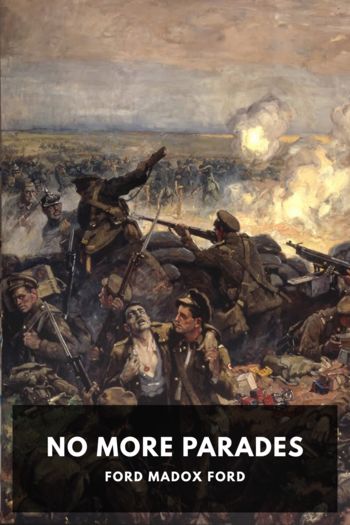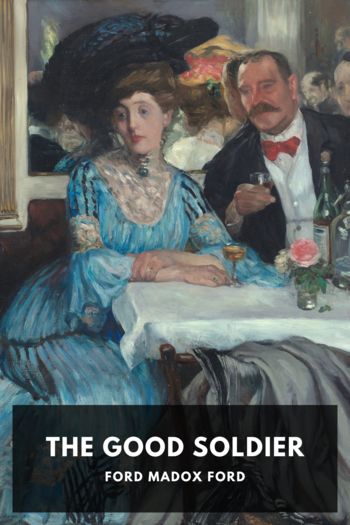Some Do Not … by Ford Madox Ford (story read aloud txt) 📕

- Author: Ford Madox Ford
Book online «Some Do Not … by Ford Madox Ford (story read aloud txt) 📕». Author Ford Madox Ford
He had counselled her to present this aspect of the matter to her mother’s cousin, the morosely portentous Rugeley. Rugeley was a great landowner—almost the greatest of all; and he was a landowner obsessed with a sense of his duties both to his dependants and his even remote relatives. Sylvia had only, Tietjens said, to go to the Duke and tell him that the Chancellor’s exactions had forced them to this move, but that they had done it partly as a protest, and the Duke would accept it almost as a personal tribute to himself. He couldn’t, even as a protest, be expected to shut up Mexborough or reduce his expenses. But, if his humbler relatives spiritedly did, he would almost certainly make it up to them. And Rugeley’s favours were on the portentous scale of everything about him. “I shouldn’t wonder,” Tietjens had said, “if he didn’t lend you the Rugeley box to entertain in.”
And that is exactly what had happened.
The Duke—who must have kept a register of his remotest cousins—had, shortly before their return to London, heard that this young couple had parted with every prospect of a large and disagreeable scandal. He had approached Mrs. Satterthwaite—for whom he had a gloomy affection—and he had been pleased to hear that the rumour was a gross libel. So that, when the young couple actually turned up again—from Russia!—Rugeley, who perceived that they were not only together, but to all appearances quite united, was determined not only to make it up to them, but to show, in order to abash their libellers as signal a mark of his favour as he could without inconvenience to himself. He, therefore, twice—being a widower—invited Mrs. Satterthwaite to entertain for him, Sylvia to invite the guests, and then had Mrs. Tietjens’ name placed on the roll of those who could have the Rugeley box at the opera, on application at the Rugeley estate office, when it wasn’t wanted. This was a very great privilege and Sylvia had known how to make the most of it.
On the other hand, on the occasion of their conversation at Lobscheid, Tietjens had prophesied what at the time seemed to her a lot of tosh. It had been two or three years before, but Tietjens had said that about the time grouse-shooting began, in 1914, a European conflagration would take place which would shut up half the houses in Mayfair and beggar their inhabitants. He had patiently supported his prophecy with financial statistics as to the approaching bankruptcy of various European powers and the growingly acquisitive skill and rapacity of the inhabitants of Great Britain. She had listened to that with some attention: it had seemed to her rather like the usual nonsense talked in country houses—where, irritatingly, he never talked. But she liked to be able to have a picturesque fact or two with which to support herself when she too, to hold attention, wanted to issue moving statements as to revolutions, anarchies and strife in the offing. And she had noticed that when she magpied Tietjens’ conversations more serious men in responsible positions were apt to argue with her and to pay her more attention than before. …
And now, walking along the table with her plate in her hand, she could not but acknowledge that, triumphantly—and very comfortably for her!—Tietjens had been right! In the third year of the war it was very convenient to have a dwelling, cheap, comfortable, almost august and so easy to work that you could have, at a pinch, run it with one maid, though the faithful Hullo Central had not let it come to that yet. …
Being near Tietjens she lifted her plate, which contained two cold cutlets in aspic and several leaves of salad: she wavered a little to one side and, with a circular motion of her hand, let the whole contents fly at Tietjens’ head. She placed the plate on the table and drifted slowly towards the enormous mirror over the fireplace.
“I’m bored,” she said. “Bored! Bored!”
Tietjens had moved slightly as she had thrown: the cutlets and most of the salad leaves had gone over his shoulder. But one, couched, very green leaf was on his shoulder-strap, and the oil and vinegar from the plate—Sylvia knew that she took too much of all condiments—had splashed from the revers of his tunic to his green staff-badges. She was glad that she had hit him as much as that: it meant that her marksmanship had not been quite rotten. She was glad, too, that she had missed him. She was also supremely indifferent. It had occurred to her to do it and she had done it. Of that she was glad!
She looked at herself for some time in the mirror of bluish depths. She pressed her immense bandeaux with both hands on to her ears. She was all right: high-featured: alabaster complexion—but that was mostly the mirror’s doing—beautiful, long, cool hands—what man’s forehead wouldn’t long for them? … And that hair! What man wouldn’t think of it, unloosed on white shoulders! … Well, Tietjens wouldn’t! Or, perhaps, he did … she hoped he did, curse him, for he never saw that sight. Obviously sometimes, at night, with a little whisky taken he must want to!
She rang the bell and bade Hullo Central sweep the plateful from the carpet; Hullo Central, tall and dark, looking with wide-open eyes, motionlessly at nothing.
Sylvia went along the bookshelves, pausing over a book back, “Vitare Hominum Notiss …” in gilt, irregular capitals pressed





Comments (0)